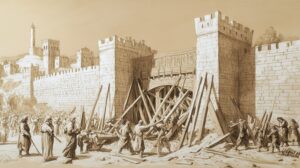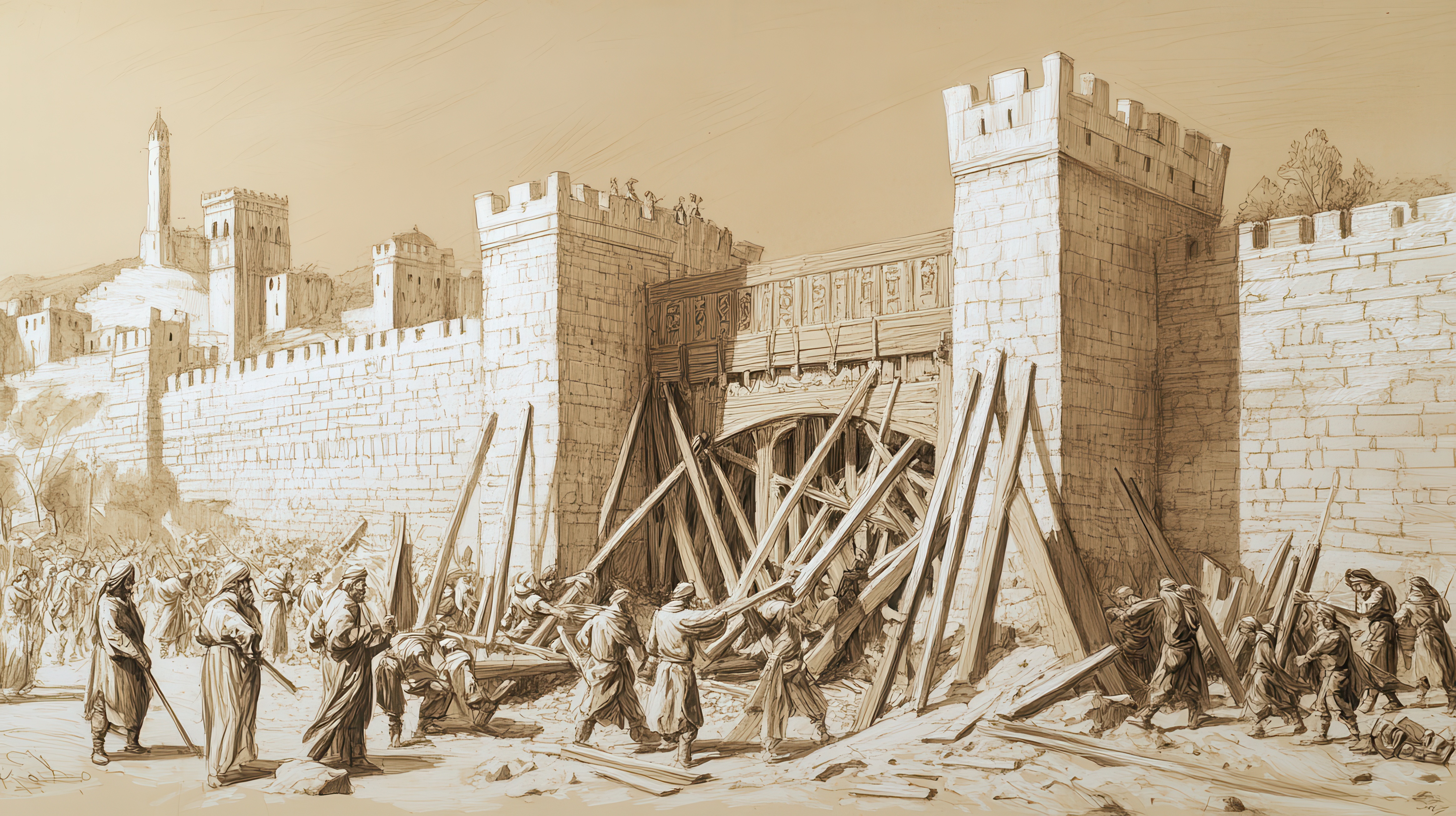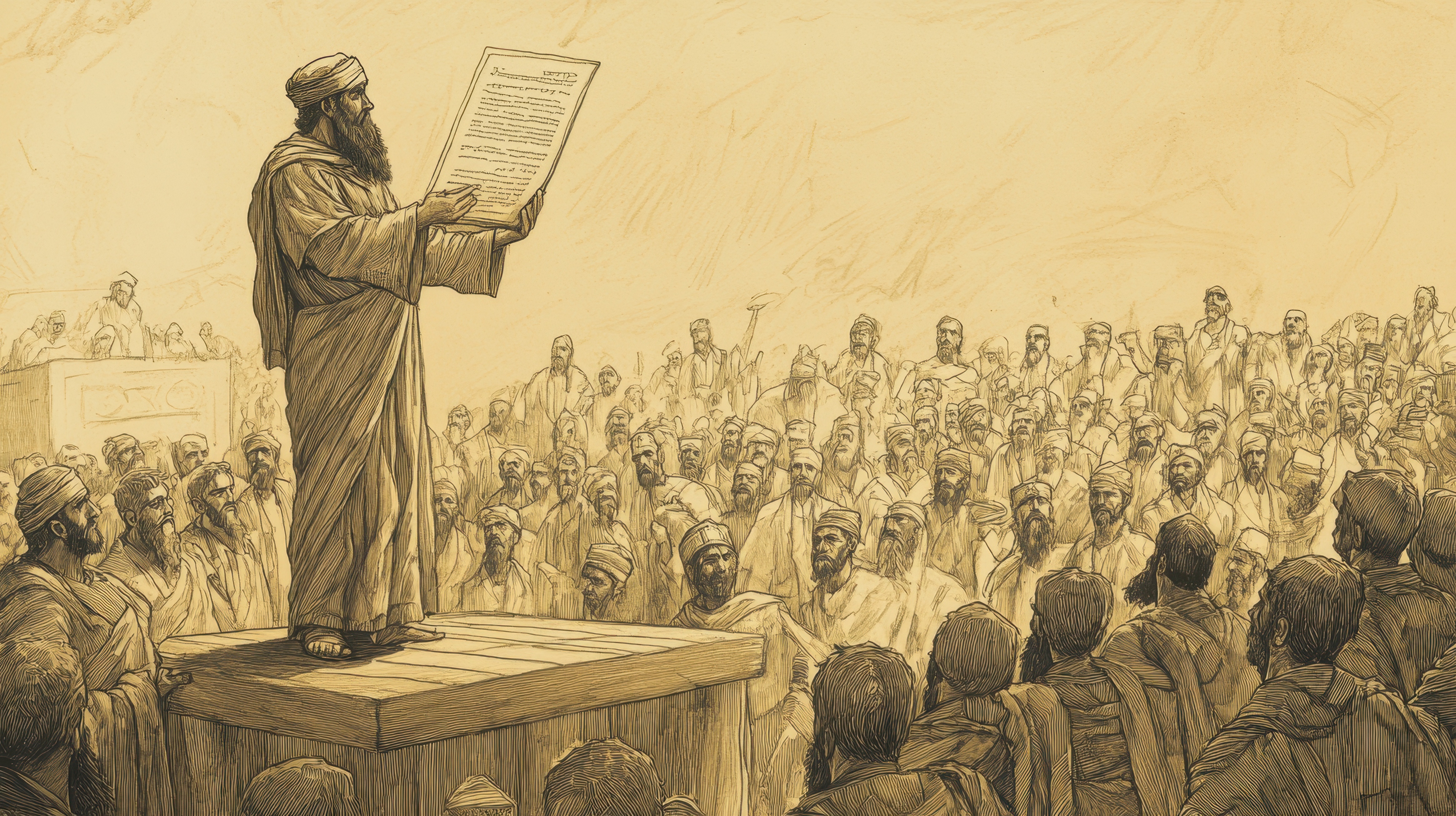Nehemiah 3-6 Building Project

Nehemiah 3-6 Building Project
Nehemiah came to Jerusalem with one purpose in mind. The building project to repair the walls of Jerusalem. On his fourth day, work starts.
When read the story of Nehemiah this time, and every other time before it, I missed something important. I missed how long it REALLY took to complete this project. In Nehemiah 6:15, we are told; “So the wall was finished on the twenty-fifth day of the month Elul, in fifty-two days.”
I KNOW that God can do ANYTHING He wants, but repairing the entire wall of Jerusalem would not be possible in under two months time if He didn’t do it Himself. It was a HUGE undertaking.
Nehemiah speaks of the time he was made governor and that he worked that whole time; for 12 years. “I also persevered in the work on this wall, and we acquired no land, and all my servants were gathered there for the work” (Nehemiah 5:16).
It took twelve years to rebuild the walls and 52 days for Nehemiah to build and hang the gates. I would have missed all this, had it not been for my trying to reconcile all that went on during the rebuilding and the timeline of Nehemiah. Too many things took place for such a short period of time.
The resource that pointed out these things to me is Bible Chronology Books. It is actually a full book that you can download for free. It details the timeline for all the books of the bible that take place during the exile; specifically, Ezra, Ester, and Nehemiah. I will definitely be taking a closer look at it for my chronology purposes. This being said, let’s get on with the story.
Nehemiah wastes little time before jumping into the work. And his words spur the people to get busy too. But things don’t go smoothly. Opposition inside and outside the people get in the way of the work. Nehemiah doesn’t let anything stop him. Let’s join in with the people as the walls go up, and let the Spirit break through any of our walls.
♥ ♦ ♥
When Nehemiah stops and saw the governors on the way to Jerusalem, he presents them with his letter from the king. In this letter, he is given to position of governor over Judah. One of the first things Nehemiah does when becoming governor is to refuse to take the governor’s portion. He will NOT take from the people to feed himself or those who have come with him. He will pay from his own pocket to feed himself and those at his table. He will also be generous to those who seek his help.
When the time comes to rebuild, Nehemiah could use his position as governor to force the people to work, but he wants willing participants. He has his list of what needs done, and a commitment to from the people to “Rise up and build.” All is ready. Nehemiah waits to see who will actually turn up to work.
SO MANY people and groups arrive to work on the wall that it thrills Nehemiah’s heart. Sections are assigned by the people’s nearness and access to particular areas. Those who live in Jerusalem work on sections near their house, the priests work on sections near them, and so on. Sections that don’t have a ‘nearness’ to a particular person or group are assigned to someone with the skill.
Rebuilding begins! Step one is clearing away the rubble where the walls are broken. Step two is cutting timbers and bringing materials to where they will be needed. Step three is assessing the still standing walls around the breaches. Ensuring that the wall will support the reconstruction efforts. Step four is closing the breaches and strengthening the wall. Step five is constructing and hanging the gates.
Sounds simple enough, but putting feet to those functions is HARD work. Clearing the rubble alone takes months and is back-breaking, intense labor. But the people do it with a smile. They know the end result, and are willing to endure the labor to arrive at that point.
Merchants, goldsmiths, perfumers, priests, Levites, people from other towns, people who had houses within the walls, even the soldiers Nehemiah brought with him labored beside one another. There are a few nobles who refuse to get their hands dirty with the work, but that doesn’t stop the others from working.
While clearing away the rubble, opposition begins. Sanballat is the most ardent of the opposition. The opposition is jeering at first.
“What are these feeble Jews doing? Will they restore it for themselves? Will they sacrifice? Will they finish up in a day? Will they revive the stones out of the heaps of rubbish, and burned ones at that?” (Nehemiah 3:2) calls Sanballat.
Tobiah, not wanting to be outdone, adds his voice. “Yes, what they are building—if a fox goes up on it he will break down their stone wall!” (Nehemiah 3:3).
Nehemiah says nothing to their taunts; out loud. He keeps working as though they are not even there. But, inwardly he prays to the Lord. “Hear, O our God, for we are despised. Turn back their taunt on their own heads and give them up to be plundered in a land where they are captives. Do not cover their guilt, and let not their sin be blotted out from your sight, for they have provoked you to anger in the presence of the builders” (Nehemiah 3:4-5).
Sanballat and Tobiah finally tire of their taunting and return home. They are still angry. They are hoping that their taunts will stop, or at least slow the work down. It doesn’t.
Building materials arrive from the forest, the quarries, and the brick ovens. It takes a while to gather all the supplies. It is likely that more timber, stones and bricks will be needed as the work continues. The people begin working with what they have now.
The neighbors have been content to throw the occasional jeering the way of those working on the wall, but not much more during these first few years. That changes when they hear that the breaches are filling in and that the wall is half its original size.
“This won’t do!” rages Sanballat. “If we don’t do something more drastic, those Jews will complete their wall and make us look impotent.”
Sanballat hatches a plot involving Tobiah and the Arabs and the Ammonites and the Ashdodites. Since their ‘war of words’ didn’t succeed, they will use a sneak attack and real weapons of warfare. “They will not know or see till we come among them and kill them and stop the work” (Nehemiah 4:11).
God shows Nehemiah and the priests the plot being cooked up.
“What are we going to do about this?”
“We will set guards at the wall, day and night. There are spaces at the base of the wall where we can station armed men to be ready when they come.”
While Nehemiah is preparing for attack from Sanballat and his group, opposition rises from the Jews living near Sanballat. They come trying to get the people to stop building as well.
“You must return to us” (Nehemiah 4:12) they called out TEN different times! They would go away for a few days, then come again. And again, and again. They also called out a lament to the workers; “The strength of those who bear the burdens is failing. There is too much rubble. By ourselves we will not be able to rebuild the wall” (Nehemiah 4:10).
After many of these assaults by their own people, Nehemiah sees the peoples’ hearts beginning to waffle. Nehemiah encourages the workers in the presence of their tormenters. “Do not be afraid of them. Remember the Lord, who is great and awesome, and fight for your brothers, your sons, your daughters, your wives, and your homes” (Nehemiah 4:14).
The Jews who were taunting the people begin to fear that the Lord may strike them. They no longer come calling out in discouragement to their brothers. But this isn’t the end of Nehemiah’s trouble.
With the plot exposed and the detractors silenced, the people return to their work on the wall. This time, they are not taking chances. They will not be caught off guard and be vulnerable to attack.
The people are split into two groups; workers, and guards. All those working on the wall have their swords strapped to their sides. Those carrying burdens do so with one hand for the burden and the other for their sword. And all those assigned to the guard group stand guard, ready for battle with sword, spear, bows, shields, and coats of mail armor.
A trumpeter was stationed so the people could rally the people. “The work is great and widely spread, and we are separated on the wall, far from one another. In the place where you hear the sound of the trumpet, rally to us there. Our God will fight for us” (Nehemiah 4:19-20).
These precautions slowed the work considerably, but the Nehemiah and the people refused to give in. The people worked from the break of dawn until the stars came out each day. “Let every man and his servant pass the night within Jerusalem, that they may be a guard for us by night and may labor by day” (Nehemiah 4:22). Also, to ensure that they will be ready at a moment’s notice, they sleep in their clothing. They are determined to finish the wall!
They are into their sixth year of building. The wall is taking shape and strengthening day by day, but there is still a long way to go. The lower sections of the wall are complete, but building the upper portion takes block and tackle and men to lift each part into place. Nehemiah ensures that each team has the tools they need for the work. He pays for these out of his own pocket.
As the work continues, the wives of the laborers come to the city. Many of the laborers are poor, or are made poor because of the work. While they are working, they don’t have the time or strength to work their fields or vineyards. Many of them have mortgaged their properties to buy food for their families in their absence. Some have even sold their children into slavery. But the worst part of all of this is that the nobles who have lent them money for food are charging them interest on their loans. Something forbidden in the Law of Moses.
When Nehemiah hears this, he cries out against the nobles. “You are exacting interest, each from his brother” (Nehemiah 5:7). He had no idea that this was going on right under his nose. He was busy tending to the safety of his workers, not their family’s needs.
Nehemiah calls an emergency meeting of all the people. Once everyone is assembled, he begins. “We, as far as we are able, have bought back our Jewish brothers who have been sold to the nations, but you even sell your brothers that they may be sold to us!” (Nehemiah 5:8).
Silence greets Nehemiah. After waiting a full minute, Nehemiah continues. “The thing that you are doing is not good. Ought you not to walk in the fear of our God to prevent the taunts of the nations our enemies? Moreover, I and my brothers and my servants are lending them money and grain. Let us abandon this exacting of interest. Return to them this very day their fields, their vineyards, their olive orchards, and their houses, and the percentage of money, grain, wine, and oil that you have been exacting from them” (Nehemiah 5:9-11).
The fear of God came over the nobles. “We will restore these and require nothing from them. We will do as you say” (Nehemiah 5:12).
Not trusting the nobles to keep their word without a witness, Nehemiah calls for a priest and has them swear the same promise they just made. After they swore before the Lord, Nehemiah goes one step further.
While shaking out the folds in his garment, Nehemiah says; “So may God shake out every man from his house and from his labor who does not keep this promise. So may he be shaken out and emptied” (Nehemiah 5:14).
It is FINALLY finished! The wall is done. There are no more breaches or weak spots. The whole process, including dealing with those who tried to stop them, took twelve years. The only thing left to do is hang the main gate.
Sanballat is running out of time! The people continued to work on the wall, no matter what he did. So, he comes up with another idea. If he can get rid of Nehemiah, the people’s efforts will come to a grinding halt and the final gates will never get hung. He sends a messenger to Jerusalem with an invitation to ‘talks’ between himself and Nehemiah. “This should get his attention” thinks Sanballat.
The messenger stands outside of the wall and calls out to Nehemiah. When Nehemiah comes near, the messenger calls out to him. “My master Sanballat calls to you; ‘Come and let us meet together at Hakkephirim in the plain of Ono’ (Nehemiah 6:2).” Nehemiah turns and goes back to work. He doesn’t even answer the messenger. After fifteen minutes of waiting on an answer, the messenger laves.
Nehemiah sees him leaving out of the corner of his eye. Nehemiah is loath to leave the work for any kind of meeting that doesn’t involve those who labor beside him, especially when the work is so close to finished. He also feels very strongly in his spirit that Sanballat is trying to do him harm. Nehemiah continues working on the main gates and sends one of his messengers instead. When he arrives at the appointed place, Sanballat is furious!
“Where is your master? Why did he not come?” he demands.
“He has sent me in his place. But I bear a message from him. ‘I am doing a great work and I cannot come down. Why should the work stop while I leave it and come down to you?’ (Nehemiah 6:3).”
Over the next month and a half, Sanballat tries three more times with the same result. Finally, Sanballat decides to try another tactic. “I bet I will get his attention this time” he tells himself. Sanballat composes a letter that outright accuses Nehemiah of sedition. A letter that, if sent to the king, will have the king put a stop to the work on the wall. Sanballat knows the letter is a lie, but if he can scare Nehemiah into thinking that his relationship with the king is in danger, he might stop the work and return to Susa; leaving the Jews to him.
Sanballat’s messenger arrives in Jerusalem with an unsealed letter in his hands. He searches out Nehemiah. As soon as he finds him, he hands the letter to Nehemiah to read it.
“It is reported among the nations, and Geshem also says it, that you and the Jews intend to rebel; that is why you are building the wall. And according to these reports you wish to become their king. And you have also set up prophets to proclaim concerning you in Jerusalem, ‘There is a king in Judah.’ And now the king will hear of these reports. So now come and let us take counsel together” (Nehemiah 6:6-7).
Shaking the letter at the messenger Nehemiah says to the messenger; “No such things as you say have been done, for you are inventing them out of your own mind” (Nehemiah 6:8).
The messenger did not get the result he was looking for. As he walks away Nehemiah thinks about Sanballat’s words and motives. “He is trying to frighten us. Sanballat thinks he can scare us into stopping our work, but it’s NOT going to work!” Instead, Nehemiah prays. “O God, strengthen my hands” (Nehemiah 6:9b).
Sanballat has one more trick up his sleeve. Sanballat hires one of the prophets, Shemeiah, in the city. His plan is to discredit Nehemiah in the eyes of the people and God.
Nehemiah is called to the home of Shemaiah, because Shemaiah is housebound. When Nehemiah enters, Shemaiah pretends to be in fear for Nehemiah’s life.
“Let us meet together in the house of God, within the temple. Let us close the doors of the temple, for they are coming to kill you. They are coming to kill you by night” (Nehemiah 6:10) Shemaiah suggests.
Nehemiah is appalled by the suggestion! “Should such a man as I run away? And what man such as I could go into the temple and live? I will not go in” (Nehemiah 6:11).
Nehemiah sees right through this ploy and refuses to go along with it. Instead, he prays again. “Remember Tobiah and Sanballat, O my God, according to these things that they did, and also the prophetess Noadiah and the rest of the prophets who wanted to make me afraid” (Nehemiah 6:14).
Nehemiah and the men who came with continue their work on the main gates. It takes them fifty-two days from start to finish. They hang the gates to great cheers! The city is now secure.
All the nations around Judah are afraid and they lose face. Especially Sanballat. No matter what they tried, they were unable to stop the small nation of Judah.
After all the work is done, Nehemiah discovers that the nobles have been writing to Tobiah about what was going on in Jerusalem. Tobiah has many of them under oath to him. He is even related by marriage to some of the Jewish nobles. Tobiah did all he could, along with Sanballat, to make Nehemiah afraid and stop the building project. They failed to stop the work of the Lord, no matter what their tactics or their choice of people.
(to be continued)
I am hoping I put all the pieces where they belong in the timeline. I’m wondering if the people ever relaxed their preparedness, including sleeping in their clothes, or if it carried on for the full time they were building. When I thought it was only fifty-two days from start to finish, this didn’t seem like such a bad idea. After learning that it was TWELVE years, I’m rethinking that precaution. I’m assuming that they took turns in this role. This seems most reasonable after reading that every ten days, Nehemiah had all kinds of wine at his dinner table. That says that they weren’t on alert the entire time. Can you imagine the stress that would bring with it?
I was also thinking about what to take from today’s story. The determination of Nehemiah is what came to my mind. He saw a need and KNEW that it was something God wanted him to do. NO MATTER WHAT, he stayed on task. He didn’t give in to adversity. He didn’t allow those around him to get discouraged either. He cared about the people and refused to take advantage of their vulnerability.
I need to be as dedicated as Nehemiah. I have things that God has called me to do that I HAVE to see them through. I know that He has a reason for calling me to this task. I PRAY that someone is being blessed by His stories. My journey to this place in my life has taken many years. I have no idea how many more it will take before I finish the task I feel calling to my heart.
Father God, help me finish strong. Give me perseverance. And give me Your direction every step of the way. Thank You for allowing me to have a part in Your Kingdom work, no matter the size. However long it takes Lord, I’ll ‘keep walking’.




